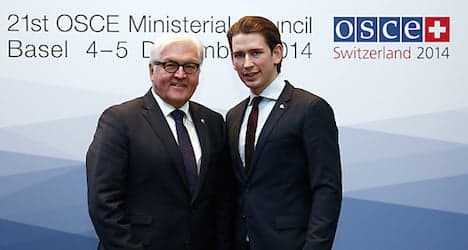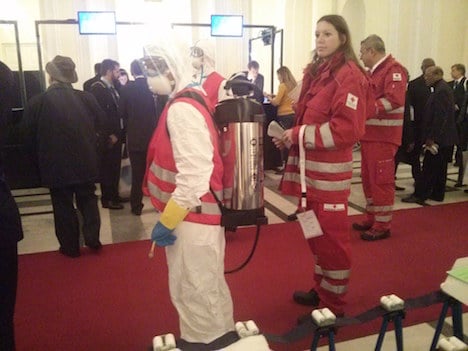Nuclear weapons meet starts in Vienna

Monday sees the start of a major two-day conference on the humanitarian consequences of nuclear weapons at Vienna's Hofburg palace.
Hosted by Austrian foreign minister Sebastien Kurz, the conference is expected to bring more than a hundred countries to the discussion, which will join together in a call for disarmament.
“Nuclear weapons are not only a permanent threat to all humankind but also a relic of the cold war that we must finally overcome. The international nuclear disarmament efforts require an urgent paradigm shift, not the least in light of the danger of further nuclear weapons proliferation”, said Kurz at a previous meeting in February.

Delegates to the meeting were greeted by people wearing radiation suits and carrying scintillation
detectors to measure possible radiation exposure. Photo: Paul Gillingwater
The Vienna Conference will build on an initiative launched in 2013 that draws to focus attention on the humanitarian consequences of and risks associated with nuclear weapons.
There have been two international conferences on the dangers, in Oslo, Norway, in March 2013, and Nayarit, Mexico in February 2014. Since the launch of the initiative the number of states participating in the initiative has grown from 127 in Oslo to 146 in Nayarit.
The Vienna Conference will focus on the short and long term consequences of nuclear weapons explosions, on public health, the environment, climate disruption, food security, migration, development related issues, infrastructure, and other consequences. It will also address various risks that could result in deliberate or accidental nuclear weapons explosions such as human error, negligence, miscalculation, technical errors and vulnerabilities of nuclear weapons and their infrastructure. Moreover, the Conference will give an overview on existing international law and the possible consequences of nuclear weapon explosions. 
Delegates with radiation exposure could expect a decontamination spray, and any
necessary medical attention from the Red Cross. Photo: Paul Gillingwater US & UK join, but Russia, China and France absent The US and Britain took part Monday for the first time in a conference of some 800 delegates from more than 150 countries exploring the risks posed by the world's 16,000 nuclear warheads.
The two countries, out of nine nations believed to have nuclear weapons, had shunned two earlier gatherings in Norway last year and in Mexico this March.
Also present in Vienna from the nine were again Pakistan and India, but absent were Russia, France and China, although a Chinese think-tank close to the country's government was present, organisers said.
Other no-shows were North Korea, which has conducted three nuclear tests, and Israel, widely assumed to be the Middle East's only atomic-armed state, although it has never acknowledged it.
The two-day meeting will focus on the potential short- and long-term consequences of a nuclear explosion, the impacts of nuclear testing and the risks of an accidental atomic blast. It includes Setsuko Thurlow, 82, a wheelchair-bound survivor from the US atomic bombing of Hiroshima, Japan in 1945, who made an impassioned speech warning against the "ultimate evil" of nuclear weapons.
Organisers hope it will also inject some momentum into troubled global moves to reduce the numbers of nuclear weapons ahead of a May 2015 conference to review progress implementing the Nuclear Nonproliferation Treaty (NPT).
"As long as nuclear weapons exist, the risk of their use -- deliberately or inadvertently -- remains real. Such a scenario, more than any other human action, has the potential of ending life on this planet as we know it," said Sebastian Kurz, foreign minister of hosts Austria. "There could not and would not be a winner in such a scenario. We have the collective responsibility for ourselves and future generations to do our utmost that they will never be used again," he said.
Comments
See Also
Hosted by Austrian foreign minister Sebastien Kurz, the conference is expected to bring more than a hundred countries to the discussion, which will join together in a call for disarmament.
“Nuclear weapons are not only a permanent threat to all humankind but also a relic of the cold war that we must finally overcome. The international nuclear disarmament efforts require an urgent paradigm shift, not the least in light of the danger of further nuclear weapons proliferation”, said Kurz at a previous meeting in February.

Delegates to the meeting were greeted by people wearing radiation suits and carrying scintillation
detectors to measure possible radiation exposure. Photo: Paul Gillingwater
The Vienna Conference will build on an initiative launched in 2013 that draws to focus attention on the humanitarian consequences of and risks associated with nuclear weapons.
There have been two international conferences on the dangers, in Oslo, Norway, in March 2013, and Nayarit, Mexico in February 2014. Since the launch of the initiative the number of states participating in the initiative has grown from 127 in Oslo to 146 in Nayarit.

Delegates with radiation exposure could expect a decontamination spray, and any
necessary medical attention from the Red Cross. Photo: Paul Gillingwater
The two countries, out of nine nations believed to have nuclear weapons, had shunned two earlier gatherings in Norway last year and in Mexico this March.
Also present in Vienna from the nine were again Pakistan and India, but absent were Russia, France and China, although a Chinese think-tank close to the country's government was present, organisers said.
Other no-shows were North Korea, which has conducted three nuclear tests, and Israel, widely assumed to be the Middle East's only atomic-armed state, although it has never acknowledged it.
The two-day meeting will focus on the potential short- and long-term consequences of a nuclear explosion, the impacts of nuclear testing and the risks of an accidental atomic blast.
Organisers hope it will also inject some momentum into troubled global moves to reduce the numbers of nuclear weapons ahead of a May 2015 conference to review progress implementing the Nuclear Nonproliferation Treaty (NPT).
"As long as nuclear weapons exist, the risk of their use -- deliberately or inadvertently -- remains real. Such a scenario, more than any other human action, has the potential of ending life on this planet as we know it," said Sebastian Kurz, foreign minister of hosts Austria.
Join the conversation in our comments section below. Share your own views and experience and if you have a question or suggestion for our journalists then email us at [email protected].
Please keep comments civil, constructive and on topic – and make sure to read our terms of use before getting involved.
Please log in here to leave a comment.